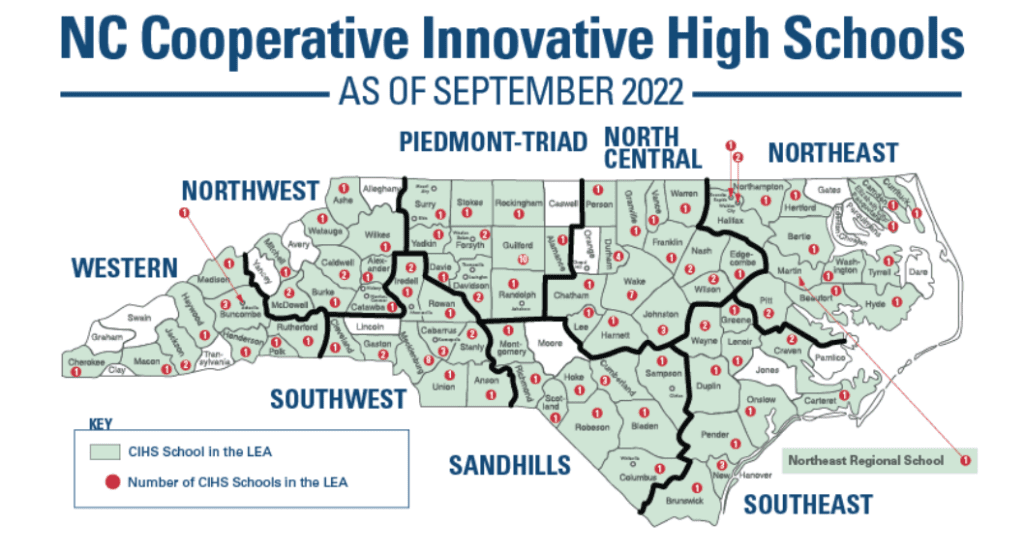
Share this story
- North Carolina has become a national leader in the early college movement with over 130 schools across the state graduating thousands of students having earned significant college credit each year at no cost to their families.
- Here is how North Carolina uses professional networks to orchestrate connections between early colleges and align efforts to support students with best practices that ensure their success.
|
|
When early colleges first emerged in North Carolina, many educators did not realize these innovative schools would grow to provide powerful educational opportunities for students in nearly every county in the state.
Early colleges are a part of the Cooperative Innovative High School (CIHS) model established by the state in 2003 to expand access to high-quality instruction and college programming in a supportive, small group environment for students whom research indicates can benefit most from the approach. These schools specifically target three types of students: those who are at risk of dropping out of high school, first-generation college students, and students who could benefit from accelerated learning opportunities.
Students who attend early colleges receive their high school diploma while also earning college credit, industry certifications, and stackable credentials from community colleges or four-year colleges and universities. While the state has a variety of dual enrollment programs where students can earn college credit in high school, early college high schools are different in that students can earn an associate degree or up to two years of college credits toward a bachelor’s degree in high school.
Over time North Carolina has become a national leader in the early college movement with over 130 schools across the state graduating thousands of students having earned significant college credit each year at no cost to their families.

Early colleges and other CIHS’s have thrived in large part because of their intentional approach to supporting student success in a rigorous learning environment. However, this is not easy work because early colleges are unique schools that support first-generation students in innovative and personalized learning environments.
For this reason, many early colleges in North Carolina have found professional networks to be essential in orchestrating connections between schools and aligning efforts to support students with best practices that ensure their success. Effective networks can improve practice by connecting individuals and organizations to collaborate, learn together, problem solve, and exchange expertise as they work towards common goals. Over time, entities like the North Carolina Department of Public Instruction, the former nonprofit NC New Schools, and more recently RTI International, have supported ways for early college high schools to connect to ensure that staff are well-trained, provided access to like-minded educators working to solve common problems, and made aware of policy expectations to ensure proper management of their programs.
More than 50 of the state’s early colleges are currently part of RTI’s Early College Network (ECN), which incorporates tenets of sound network design to facilitate the sharing of expertise among early colleges and similar CIHS’s across the state. Well-designed networks create value for members by:
- Providing opportunities for members to learn and collaborate around common goals.
- Allowing members to distribute expertise and develop solutions to common problems of practice.
- Facilitating the co-creation and sharing of tools and resources among members.
- Providing systems of support across challenging environments.
Networks can also help those who may feel isolated in their roles connect to a professional community where members can find peers to support them with solving complex problems, gain strategies that support structural and cultural changes, and work with others who have similar goals.
Early colleges have to navigate unique challenges like operating as a high school on a college campus (or having to bus students to a remote campus), integrating high school and college schedules for students, building community awareness about the benefits of students attending an early college, and recruiting students who can benefit from the school. The ECN leverages the “power of the network” to help members collaborate and share expertise to address these types of challenges and to drive education where it matters most – in the daily lives of students.
ECN member and Hertford County Early College Principal Lyndsay Britt shared, “The ECN has been instrumental to my growth as a principal. Through my participation, I can collaborate, explore problems, gain solutions, and build relationships with early college leaders in our ever changing world of education. I am grateful for the opportunity to be a part of this network and it has been a great resource for me.”
The sentiments shared by Britt and other early college principals highlight the value of engaging in networks, especially for educators in these unique schools.
Currently schools who are a part of the ECN have multiple opportunities to gain support from their peers as members engage in networking sessions throughout each school year are designed to increase the knowledge of participants, facilitate change, and share innovative strategies that will support the specialized needs of each school’s students. The ECN also convenes an annual Early College Summit where educators from across the state come together to receive professional development, hear from thought-provoking speakers, and engage in team planning time to ensure smooth implementation of new strategies.
In addition to sharing expertise among members, a key function of an effective network is the creation of new resources. Three years ago members of the ECN joined forces to co-author the Next Generation Early College Framework. The framework focuses on five research-based design principles that serve as an early college blueprint for schools to implement and innovate based on best practices. The design principles include a focus on
- Creating a personalized and emotionally supportive environment.
- Providing an innovative instructional environment.
- Leveraging home, community and the workplace to support the school.
- Preparing students for post-secondary education and careers.
- Fostering a growth mindset that supports shared responsibility, reflective practice, and inquiry.
Schools that regularly use the framework have found it to be a helpful tool to hone their approach as they work to serve students in these unique contexts. For example, Jackie Harris, principal of Granville Early College High School, shared that her staff uses the framework for self-reflection at the end of the year, and to inform their School Improvement Plan (SIP) goals for the coming year. Her staff also uses the framework to develop individual professional goals that align with overall school and district goals while incorporating early college best practices.
Through ongoing collaboration and dedication, early colleges are continuing to demonstrate how innovative school models can have a significant positive impact on students and their families across North Carolina. This has been made clear through research, and also in the success that students experience in these schools.
It is little surprise that North Carolina has become known as a national leader in the early college movement. The next three articles in this series will take a closer look at early college research, what innovation looks like in early college environments, and what early college graduates can tell us about the impact these schools are having on lives across the state.
If you aren’t aware of how early college high schools are serving students and families in your region of North Carolina, we encourage you to take a closer look. You are likely to find an inspiring learning environment, thriving students, and the type of successful innovation in education that is needed to prepare students to thrive in a complex world.






